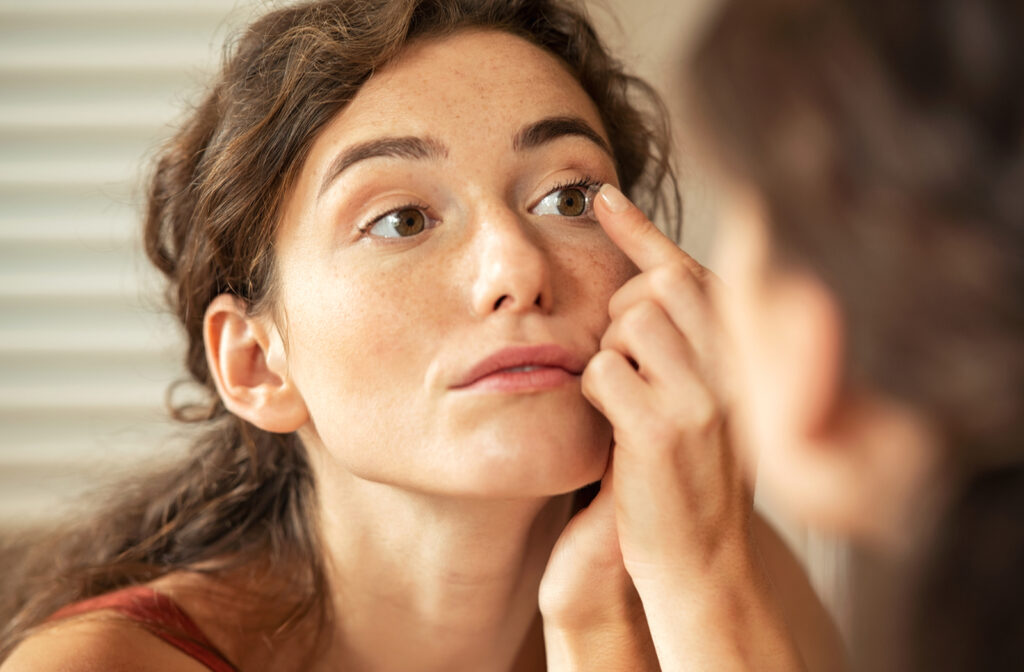According to the Centers for Disease Control and Prevention, about 45 million people in the United States wear contact lenses. While contact lenses are usually undetectable, wearing them can make pre-existing conditions worse or cause new visual symptoms.
Dry Eye is a common condition among both contact lens wearers and non-wearers alike, but the symptoms can become more severe if you wear contact lenses.
The good news is, you don’t have to give up wearing contact lenses if you have dry eye. There are several things you can do to manage your dry eye while wearing contact lenses.
What is Dry Eye?
Dry Eye occurs when your eyes don’t produce enough good-quality tears to keep your eyes lubricated and comfortable.
There are two types of dry eye:
- Aqueous tear-deficient dry eye is when the eye’s lacrimal glands don’t produce enough tears to keep the eye moist.
- Evaporative dry eye occurs when the eye’s meibomian glands produce poor-quality tears. Usually, this means that there isn’t enough of the lipid layer in your tears, which causes your tears to evaporate too quickly, leaving your eye dry.
Causes, Symptoms & Risk Factors of Dry Eye
Causes
Several different factors can cause dry eye. These include:
- Damage to the tear glands or any part of the eye
- Certain diseases, such as Sjogren’s syndrome and other autoimmune conditions
- Medications such as antihistamines, antidepressants or blood pressure medications
- Hormone changes or menopause
- Allergies
- Wearing contact lenses for long periods
Symptoms
In addition to your eyes feeling uncomfortable while wearing your contact lenses, you may experience other dry eye symptoms after wearing contact lenses. Some of these symptoms may include:
- Stinging, burning, or itchiness
- Eye redness
- A sandy or gritty feeling in the eye
- Abnormal discharge
- Watery eyes
- Blurred vision
- Eye fatigue or eye strain
- Sensitivity to light
Risk Factors
The risk factors associated with dry eye include:
- Exposure to environmental irritants such as wind, low humidity, air-conditioning, sun, smoke, chemical fumes, or heat
- Allergies
- Eye surgery, such as refractive surgery (LASIK) and cataract surgery
- Taking certain medications
- Long-term contact lens wear
- Age
- Female gender
How Do Contacts Effect Dry Eye?
Wearing contact lenses can cause your eyes to dry out because the thin layer of contact lens material on your cornea limits oxygen flow to the eyes. Without a steady flow of oxygen, your eyes struggle to develop natural tears.
Some of the additional reasons contacts cause dry eye include:
- Overwear
- Wearing the wrong prescription
- Your contacts aren’t the proper fit
To lower your risk of developing Dry Eye caused by contacts, make sure you receive a proper contact lens exam before wearing contacts.
Tips for Managing Dry Eye While Wearing Contacts
Even if you’re a contact wearer, standard Dry Eye treatments such as artificial tears will still work to treat your dry eye.
But when it comes to managing your dry eye while wearing contacts, there are several additional steps you can take to lower the severity of your systems. The four most common ways to manage dry eye while wearing contacts are centred around:
- The type of contact lenses you wear
- The contact solution you use
- If you’re caring for your lenses properly
- Your lifestyle choices

Type of Contact Lenses
Contact lenses can stop your eye from getting enough oxygen, resulting in dryness. If you are suffering from contact related dry eye, your doctor may recommend any of the following types of contact lenses:
- Silicone hydrogel contact lenses allow for up to 5 times more oxygen to reach the eye than other types of contact lenses. As a result, they can be worn for a longer period while reducing eye dryness.
- Low water content contact lenses allow more oxygen to flow to the eye and draw liquid to the tear film, which helps alleviate dry eye symptoms.
- Daily disposable contact lenses give your eyes a break from the effects of overwear.
- Scleral lenses cover the entire corneal surface, ensuring that the eyes’ front surface doesn’t dry out.
- Orthokeratology lenses are gas-permeable contact lenses that you wear overnight. They reshape the cornea while you sleep, so you don’t need to wear contacts during the day. This reduces contact lens-related dry eye symptoms.
Contact Solutions
Sometimes dry eye is not caused by contact lenses but is instead caused by the solution you’re using to clean them. Some solutions contain substances that can irritate your eyes, causing adverse reactions or drying them out.
If you think your contact solution may be the issue, you should:
- Check with your eye doctor to see if they have any recommendations
- Try different brands until you find one that works for you
Caring for Your Contact Lenses
Adhering to a proper contact lens hygiene routine can have a significant impact on your eye health. If you’re using the wrong solution or not cleaning your contacts properly, this could be why you’re suffering from dry eye.
To avoid hygiene-related dry eye issues, make sure you are:
- Disposing of your contact lenses appropriately depending on what your eye doctor recommends
- Changing your contact lens case every few weeks to prevent germ build-up
- Not wearing contact lenses when ill with a cold or the flu, or if you have an eye infection as there is an increased risk of transferring germs into the eyes. Remove contact lenses if you have an eye infection like pink eye
Lifestyle Choices
In addition to maintaining a healthy weight and ensuring you’re eating a healthy diet, there are specific vitamins that you can take to promote healthy vision and eyes. The best eye vitamins and supplements include:
Additional Tips
Beyond dry eye and contact lenses, it is crucial to maintain proper eye health. To make sure your eyes stay healthy and seeing well, it is essential to:
- Make sure you’ve been fitted for your contact lenses by an eye doctor
- Regularly get your eyes examined
- Avoid wearing contact lenses for extended periods if you are suffering from symptoms
If you wear contact lenses and struggle with dry eyes, contact us today!


